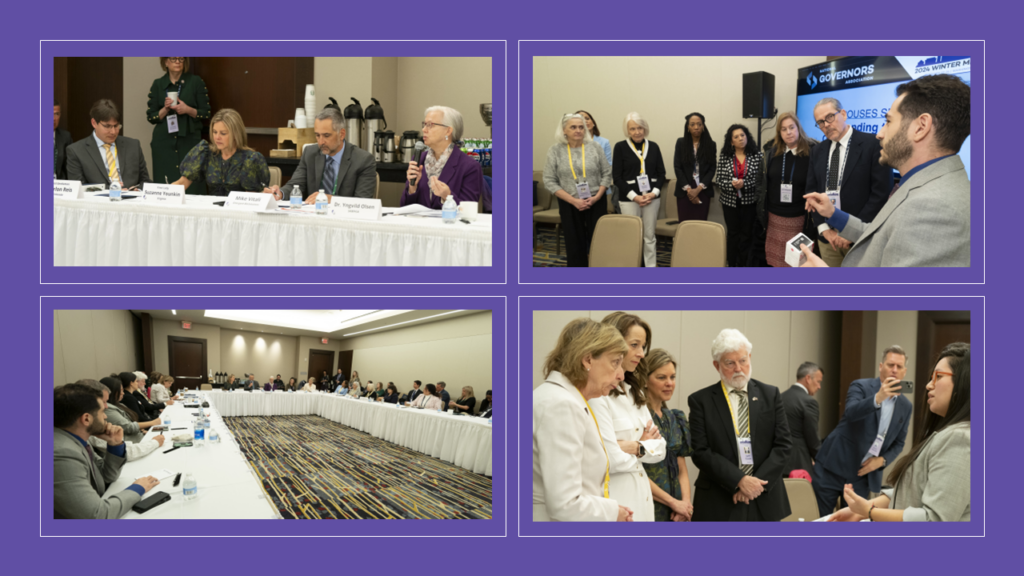At NGA’s 2024 Winter Meeting, the nation’s First Spouses joined together in a session to raise awareness about overdose prevention initiatives and to receive training on how to use naloxone, with the participating First Spouses leaving the meeting with the overdose reversal medication in-hand.
Utah First Lady Abby Cox hosted the session, and NGA Program Director Marianne Gibson moderated a discussion spotlighting state and federal initiatives to increase fentanyl awareness and improve behavioral health.
During the session, First Spouses heard from Ms. Delaine Mazich, a Virginia resident who lost her son Greyson in 2020 to fentanyl poisoning during his senior year of college. Ms. Mazich pointed out the public’s lack of awareness about fentanyl at the time of her son’s death. Overdose deaths among adolescents 10-19 years old increased 109% between 2019 and 2021, with many tied to the increased availability of counterfeit pills that appear to be prescription drugs but in fact contain fentanyl. It is not coincidental that this increase in overdose deaths parallels the worsening mental health among youth at the height of the COVID-19 pandemic. Young people are known to take risks, but there has never been a more dangerous time to purchase pills on the illicit drug market.
Virginia First Lady Suzanne Youngkin discussed Virginia Governor Glenn Youngkin’s Right Help, Right Now initiative, which includes the It Only Takes One awareness campaign. By educating the public, the campaign targets faulty perception of risk that one pill from an unknown source isn’t dangerous. The campaign includes messaging such as “I was just trying to feel better…,” and “I was just trying to focus better…,” speaking to the wide range of reasons young people use counterfeit pills and weaving in an understanding of the current state of youth mental health and the desire to self-medicate. The campaign complements the other aspects of Governor Youngkin’s Right Help, Right Now initiative, a legacy project to overhaul the behavioral health system, which already represents a 1.4-billion-dollar investment in Virginia. Mrs. Youngkin also drew attention to the ubiquity of the issue, highlighting a RAND report that notes 40% of Americans personally know someone who has died of a drug overdose.
Dr. Yngvild Olsen, Director of the Center for Substance Abuse Treatment at SAMHSA and an addiction medicine specialist physician, stressed the importance of distributing opioid overdose reversal medications such as naloxone amidst the widespread prevalence of fentanyl, which has replaced heroin in many regions of the country. As a result of fentanyl proliferation, the population at risk for opioid overdose has widened significantly and includes, for example, people who use stimulants and adolescents who believe they are purchasing prescription drugs. SAMHSA is working with cross-agency teams from many states to develop strategies and plans to “saturate” their communities with naloxone – in other words, to distribute a sufficient amount and target that distribution to those most likely to experience or witness an overdose, so that the medication is present wherever and whenever an opioid overdose occurs. In January, SAMHSA also released the Overdose Prevention and Response Toolkit, which provides updated foundational information about opioid overdose and reversal medications in the context of new medications available, the current risk environment, and recent research and evidence.
As Vice President of State Government Affairs at Emergent BioSolutions, Mike Vitali spoke from the perspective of a manufacturer of an overdose reversal medication (NARCAN), and particularly one working in the community to increase access, reduce stigma and remove barriers. NARCAN became the first available nonprescription overdose reversal medication last year, appearing on pharmacy shelves in August 2023. While most states do have a mechanism for Medicaid coverage of over-the-counter naloxone, some still do not, an important issue considering the disproportionate prevalence of substance use disorder in this population. Mr. Vitali also highlighted the recent Ready to Rescue campaign to raise awareness as well as reduce stigma.
Following speaker remarks, representatives of both Maryland’s and Virginia’s overdose education and naloxone distribution programs trained the First Spouses to recognize and respond to the signs and symptoms of an opioid overdose, including by administering naloxone. First Spouses were equipped not only with information but also with the necessary tools to save a life, receiving a personal naloxone kit to take with them to equip with a resource to help them to respond in the event of an overdose emergency.
REVIVE! is the opioid overdose and naloxone education program for the Commonwealth of Virginia, providing training on how to respond and how to train others on overdose response. The Overdose Response Program is Maryland’s statewide program to authorize local programs to provide community overdose response training and distribute naloxone. This brief was prepared by Dana Heilman, Senior Policy Analyst, Center for Best Practices. Please contact dheilman@nga.org with any questions.













